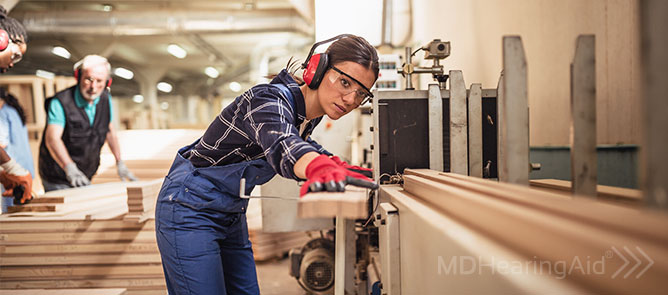Ears are complex organs. The outer ear brings all kinds of sound waves your way and funnels them toward the middle ear and inner ear. From there, thousands of tiny nerve endings send waves along the auditory nerve to your brain, and your brain tells you what you’re hearing.
Ears are also delicate. They can get infections, blockages, and spasms, and they can end up with temporary or permanent damage. This damage might cause a lot of pain or even hearing loss.
Sometimes, you can even get odd sounds in your ears that aren’t from your surroundings. Crackling is one of those sounds.
What Is Crackling in the Ear?
Ear crackling is a sound you might hear when you swallow, yawn, talk, or move your head. This sound is like the noise you hear when you pour milk on crispy rice cereal, or when you’re crumpling up a bunch of tissue paper. Sometimes, the crackling sounds more like popping. This could be like the sound of popping a lot of tiny bubbles on bubble wrap packaging.
In all of these cases, the crackling sound is coming from inside your head. But what causes this crackling in the ear?
What Causes Crackling in Ears
This bothersome and sometimes painful sound has several causes.
Earwax Blockage
Everyone has earwax in their ears. This substance—called cerumen—is a type of waxy oil that comes from glands in your ear canal. While earwax helps protect the ear from bacteria and sharp objects in the ear canal, too much of it can cause issues as well.
If your ear makes too much earwax, you might get blockages in the ear canal. You should never use cotton swabs or fingers to remove the blockage because these can move the wax further into the ear and lead to poor hearing.
Earwax blockages can cause crackling, popping, or clicking sounds. They can also cause pain, pressure in the ear, itching, or even partial hearing loss.
Middle Ear Myoclonus
If you have crackling in your ear, you might also have middle ear myoclonus, or MEM. This disorder is a rare type of tinnitus—a condition from middle or inner ear damage that often leads to ringing or buzzing in the ears.
With MEM, the two muscles in your middle ear start to spasm. These muscles, the tensor tympani and stapedius, can act up together or separately.
If you hear a crackling or buzzing, your stapedius muscle could be spasming. If you hear clicking, your tensor tympani could be to blame. Sometimes, the muscles might make other sounds—such as whooshing, ticking, or bubbling.
Ear muscle spasms have a few causes. MEM could be the result of another health condition, such as a tumor in the ear or base of the brain. It could also be from a degenerative health disease like amyotrophic lateral sclerosis (ALS) or multiple sclerosis (MS). Sometimes, the spasm starts because the tissues around the muscles aren’t getting enough oxygen.
In any case, you might get crackling in one ear or both, and you might hear it nonstop or once in a while. The intensity of the crackling—how loud it is—can vary as well.
Temporomandibular Joint Disorders
Another cause might be a problem with your temporomandibular joint (TMJ). Also called TMD or TMJD, this group of conditions affects the temporomandibular joint that connects your jawbone to your head. The TM joint has a soft disk, cartilage, and nerve endings that meet the two bones, and it helps your jaw open and close. This joint also helps you eat and talk.
Sometimes, the joint stops working. This might be from a jaw injury, a type of arthritis, or a worn-out disk. You might even get this condition if you grind your teeth a lot. According to the National Institute of Dental and Craniofacial Research, more than 10 million people in the United States have some form of TMJ disorder.
You might get stiffness or locking in your jaw, or you might feel pain in your jaw or around your ear. If the joint doesn’t open and close smoothly, it can even make it hard to chew or talk. A disorder with the TM joint can cause a clicking, crackling, or popping sound.
Eustachian Tube Dysfunction
Blockages in the eustachian tube are common in children, but they can happen in adults as well. Normally, your eustachian tube connects your middle ear with your nasopharynx. This is where your upper throat meets your nasal cavity—at the back of the nose.
The eustachian tube helps equalize the pressure in your middle ear and drain any fluid that builds up. If the tube or the opening to it has a blockage, it can’t work like it should. This could happen from illnesses like colds, flus, or sinus infections. It might also happen from allergies or anything that bothers the back of the throat—like smoke or pollution.
Eustachian tube dysfunction can lead to pain and pressure in your ears, which may make it hard to hear. You can also get fluid in the middle ear that doesn’t drain away. Fluid blocking the sound waves could also cause hearing loss. This combination might even lead to strange sounds like crackling, buzzing, or popping.
Acute Otitis Media
Infections can also cause crackling in the ear. An infection in your middle ear is acute otitis media, and it happens when bacteria or viruses find their way in.
If you have eustachian tube dysfunction with fluid buildup in the middle ear, you’re more likely to get acute otitis media as well. This is because the fluid can help the bacteria or viruses spread and create an infection.
Acute otitis media causes a lot of pain in the affected ear. It might even cause nausea, confusion, or a severe headache.
How to Get Rid of Crackling in Ears
Getting rid of crackling in your ears depends on what’s causing the problem. While crackling might go away on its own, it can also require medical treatment.
If you have an infection in your middle ear, your doctor will give you antibiotics or antiviral medications. They may suggest over-the-counter (OTC) medications like acetaminophen or ibuprofen if you have a lot of pain as well.
Blocked or clogged eustachian tubes often go away after your cold or flu clears up. But they can be uncomfortable while you’re sick. Your doctor might suggest a decongestant for illnesses or an antihistamine for allergies. These medications can help reduce the swelling and open up a blocked tube.
If these methods aren’t working, your doctor might suggest balloon dilation or ear tubes. The first treatment puts a small balloon device in your ear to open the eustachian tube. The second treatment inserts small tubes in your eardrum to let the fluid drain out. It also helps equalize the pressure.
Problems with your temporomandibular joint sometimes need surgery. But some types of medications that relax muscles or calm inflammation can help with the pain and stiffness.
For earwax blockage, your doctor might recommend OTC ear drops. These drops contain carbamide peroxide or hydrogen peroxide, which helps to dissolve trapped wax. If the wax isn’t moving, or if it’s causing a lot of pain and hearing loss, your doctor might refer you to a specialist. This might be an audiologist or an ear, nose, and throat (ENT) specialist—also called an otolaryngologist.
Do’s and Don’ts for Good Ear Health
To keep your ears in good health, you want to follow some best practices.
- Do get your hearing and ears tested. You can use an online hearing test or visit an ear specialist for in-person care.
- Do keep your ears dry when swimming or bathing. You might want to use a swim cap if you like to put your head underwater.
- Do use earplugs if you work around loud machinery or other sounds.
- Don’t put cotton swabs or fingers into your ear. Not only can this push wax into your ear, but it can scratch delicate skin or even bring in bacteria.
- Don’t leave earbuds in your ears for a long time. They can trap moisture, create infections, or prevent earwax from draining normally.
- Don’t ignore any pain or sudden hearing loss. This could be the sign of a serious problem that could lead to permanent damage.
When to See a Doctor About Crackling in Ears
Your hearing is important. If you have pus, pain, muffled hearing, fever, or pressure in your ears, speak to your doctor. You can also head to a local hearing clinic for professional treatment.
Crackling in ears doesn’t always mean you’ll get hearing loss. But it can. If your hearing loss affects your quality of life, consider some of the top hearing aid brands.
Hearing aids, like those from MDHearing, can give you improved hearing and more freedom to be yourself.
At MDHearing, our high-quality hearing aids are an affordable solution for anyone with hearing loss. We have FDA-registered models as low as $299 per pair and a team of licensed hearing professionals dedicated to quality and care. Take our online hearing test today to see if you might benefit from hearing aids.
Check your hearing for free and get your results instantly.
TAKE ONLINE HEARING TEST

